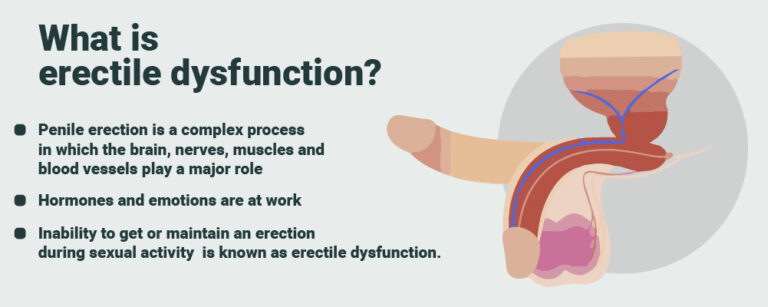Holistic Approaches to Erectile Health: Mind, Body, and Beyond

Understanding Erectile Health
Erectile health is a topic that can often be surrounded by confusion and embarrassment. However, it is important to understand that it is a common concern that affects many individuals at different stages of their lives. Erectile dysfunction, also known as impotence, refers to the inability to achieve or maintain an erection that is firm enough for sexual intercourse.
There are various factors that can contribute to erectile dysfunction, both physical and psychological. Physically, it may be caused by underlying health conditions such as heart disease, diabetes, high blood pressure, or obesity. Lifestyle choices such as smoking, excessive alcohol consumption, and drug use can also play a role. Psychologically, stress, anxiety, depression, and relationship problems can all impact erectile health. It is essential to address these potential causes in order to effectively manage and improve erectile function.
Understanding the complexities of erectile health is crucial in order to seek appropriate help and treatment. By discussing this topic openly and seeking professional advice, individuals can take steps towards managing and improving their sexual health. It is important to remember that erectile dysfunction is a medical condition that can be treated, and with the right guidance and support, individuals can regain a fulfilling and satisfying sex life.
The Connection Between Mind and Erectile Health
The mind-body connection is a fundamental aspect of human health, and this is no exception when it comes to erectile health. Research suggests that psychological factors can significantly impact a man’s ability to achieve and maintain an erection. Stress, anxiety, depression, and relationship issues are just a few examples of the psychological factors that can affect erectile function.
Numerous studies have demonstrated the link between stress and erectile dysfunction (ED). When a person experiences stress, their body releases hormones, such as cortisol, that can interfere with the normal physiological processes involved in achieving and maintaining an erection. In fact, a study published in the Journal of Sexual Medicine found that men with higher stress levels were more likely to experience ED. Moreover, anxiety and depression can also contribute to erectile problems. These conditions can cause reduced libido, increased fatigue, and impaired sexual performance, all of which can contribute to difficulties in achieving and maintaining an erection.
It is important to recognize and address the psychological factors that may be impacting one’s erectile health. By managing stress, seeking emotional support, and engaging in stress reduction techniques, men can potentially improve their erectile function. In the following sections, we will explore various strategies and lifestyle changes that can help enhance both emotional well-being and erectile health. It’s crucial to understand that seeking professional help, such as therapy or counseling, can be beneficial for individuals facing significant psychological barriers to sexual health.
Psychological Factors Affecting Erectile Health
Psychological factors can play a significant role in erectile health, as our mental and emotional well-being can directly impact our sexual function. Stress, anxiety, depression, and relationship issues are all psychological factors that can affect erectile health. When a person is stressed or anxious, their body releases stress hormones, such as cortisol, which can interfere with the normal functioning of the reproductive system.
Research has shown that high levels of stress can lead to a decrease in testosterone production, which can impact erectile function. In addition, anxiety about performance or relationship problems can also contribute to erectile issues. When a person is constantly worried or preoccupied with their sexual performance, it can create a cycle of anxiety and self-doubt that can further worsen erectile dysfunction.
Furthermore, depression has been linked to erectile dysfunction. The feelings of sadness, hopelessness, and low self-esteem associated with depression can affect a person’s interest in sexual activities and make it difficult to achieve or maintain an erection. Additionally, relationship problems, such as unresolved conflicts or lack of intimacy, can also contribute to erectile difficulties.
Addressing these psychological factors is crucial for improving erectile health. Seeking therapy or counseling can help individuals explore and resolve any underlying emotional issues that may be contributing to their erectile difficulties. By addressing and managing stress, anxiety, and depression, individuals can enhance their overall well-being and potentially improve their erectile function.
It is important to remember that psychological factors affecting erectile health are complex and can differ from person to person. Consulting with a healthcare professional or psychologist is recommended to get personalized advice and guidance on how to manage and overcome these psychological factors for improved erectile health.
Emotional Well-being and Erectile Function
Maintaining emotional well-being is not only essential for overall mental health but also plays a significant role in sexual function, including erectile health. The mind and body are closely interconnected, and emotional well-being can have a profound impact on sexual desire, arousal, and performance.

Research has shown that psychological factors such as stress, anxiety, depression, and low self-esteem can contribute to erectile dysfunction (ED). The stress hormone cortisol, which is released during times of emotional distress, interferes with the production of testosterone, the hormone primarily responsible for sexual desire in men. Additionally, negative emotions can lead to decreased blood flow to the penile area, making it more difficult to achieve and maintain an erection.
It is crucial to address and actively manage emotional well-being to improve erectile function. A variety of strategies can help promote emotional well-being, such as engaging in regular exercise, practicing stress management techniques like meditation or deep breathing exercises, seeking professional help through counseling or therapy, and fostering open communication and intimacy in relationships. By prioritizing emotional well-being and adopting healthy coping mechanisms, individuals can potentially enhance their sexual health and overall quality of life.
Stress Management Techniques for Improved Erectile Health

Chronic stress has been known to have a negative impact on various aspects of our health, including erectile function. The pressure and demands of everyday life can often lead to increased levels of stress, putting a strain on our mental and physical well-being. When it comes to sexual health, stress can play a significant role in causing or exacerbating erectile issues.
One effective stress management technique that can help improve erectile health is exercise. Engaging in regular physical activity has been shown to reduce stress levels, improve mood, and increase overall well-being. In fact, a study published in the Journal of Sexual Medicine found that men who participated in moderate to vigorous physical activity on a regular basis had a lower risk of experiencing erectile dysfunction. So, whether it’s hitting the gym, going for a run, or even taking a brisk walk, incorporating exercise into your routine can have a positive impact on both your stress levels and your erectile function.
The Role of Sleep in Maintaining Erectile Function
Sleep plays a crucial role in maintaining erectile function, and inadequate sleep can have a negative impact on sexual health. During sleep, the body goes through various stages, including rapid eye movement (REM) sleep and non-REM sleep. These stages are important for the body to repair and rejuvenate itself, including the blood vessels and nerves responsible for erectile function.
Research studies have shown a strong correlation between sleep disorders, such as sleep apnea, and erectile dysfunction. Sleep apnea is a condition characterized by pauses in breathing during sleep, which disrupts the normal sleep cycle. It has been found that individuals with sleep apnea are more likely to experience erectile problems than those without the condition.
A study published in The Journal of Sexual Medicine found that men with severe sleep apnea were more than twice as likely to have erectile dysfunction compared to men without sleep apnea. This suggests that the quality of sleep is just as important as the quantity.
Furthermore, sleep deprivation has been shown to decrease testosterone levels, a hormone essential for sexual desire and erectile function. A study published in the Journal of the American Medical Association found that men who had only 5 hours of sleep per night for one week had significantly lower testosterone levels compared to those who had a full 8 hours of sleep.
In addition to hormonal changes, lack of sleep can also contribute to higher levels of stress and fatigue, which can directly impact sexual performance. It is important to prioritize sleep and ensure that you are getting enough restful sleep each night to keep your erectile function in optimal condition.
Nutrition and Erectile Health: What to Eat for Optimal Performance
Maintaining a healthy diet plays a crucial role in supporting optimal erectile function. Certain nutrients have been found to promote blood flow, boost testosterone levels, and improve overall sexual health. Incorporating these foods into your daily meals may contribute to better erectile performance.
Firstly, incorporating fruits and vegetables into your diet is essential for overall health and can have positive effects on erectile function. Research suggests that foods rich in antioxidants, such as berries, citrus fruits, and leafy greens, may help improve blood flow by reducing oxidative stress and inflammation in the body.
Furthermore, including lean proteins in your diet can be beneficial for erectile health. Foods like fish, poultry, and lean cuts of meat are excellent sources of L-arginine, an amino acid that supports the production of nitric oxide. Nitric oxide helps relax blood vessels, allowing for improved blood flow to the penis.
In addition to fruits, vegetables, and lean proteins, incorporating whole grains and healthy fats into your diet can also contribute to optimal erectile performance. Whole grains, such as quinoa and oats, provide fiber and essential nutrients that support overall cardiovascular health. Healthy fats, found in foods like avocados, nuts, and olive oil, can help increase testosterone levels, which are essential for sexual function.
While diet alone may not be a cure-all for erectile issues, adopting a balanced and nutrient-rich eating plan can contribute to overall sexual health. It’s important to consult with a healthcare professional and consider personalized recommendations based on your individual circumstances and needs. Remember, small changes in your diet can lead to significant improvements in your sexual well-being.
Exercise and Physical Fitness for Enhancing Erectile Function
Regular exercise and maintaining physical fitness have been shown to have a positive impact on erectile function. Numerous studies have demonstrated that engaging in regular exercise can improve blood flow, enhance cardiovascular health, and boost overall sexual performance. According to a study published in the Journal of Sexual Medicine, men who engaged in moderate to vigorous intensity exercise for at least 40 minutes, four times per week, experienced improvements in erectile function and sexual satisfaction.
Exercise can help improve erectile function by enhancing the body’s production of nitric oxide, a key component in the process of achieving and maintaining an erection. When we exercise, our blood vessels dilate, allowing for increased blood flow throughout the body, including the arteries that supply the penis. This increased blood flow can result in stronger and longer-lasting erections. Physical fitness and exercise can also contribute to overall confidence and self-esteem, which can positively impact sexual performance and satisfaction.
It is worth noting that incorporating a variety of exercises into your routine can be beneficial. A combination of cardiovascular exercises, such as jogging or cycling, and strength training exercises, such as weightlifting or resistance training, can help improve erectile function by promoting healthy blood circulation and maintaining muscle tone. However, it is important to consult with a healthcare professional before starting any new exercise program, especially if you have any underlying medical conditions.
Natural Supplements and Herbs for Erectile Health
The use of natural supplements and herbs has become increasingly popular in promoting erectile health. These alternative remedies are often sought out by individuals looking for natural ways to enhance their sexual function. While there is limited scientific evidence supporting the effectiveness of these supplements and herbs, some studies have shown promising results.
One such herb is Panax ginseng, also known as Korean red ginseng. It has been used for centuries in traditional medicine for its potential benefits in improving erectile dysfunction. A study published in the Journal of Urology found that men who took Panax ginseng experienced significant improvements in erectile function compared to those who were given a placebo.

Another herbal supplement that has gained attention is L-arginine. L-arginine is an amino acid that helps produce nitric oxide, a compound that plays a crucial role in dilating blood vessels and improving blood flow. A review of multiple studies published in the British Journal of Urology International suggests that L-arginine may have a positive impact on erectile function, particularly in individuals with mild to moderate erectile dysfunction.
It is important to note, however, that natural supplements and herbs can vary in quality and potency. Additionally, they may interact with certain medications or have side effects. Therefore, it is essential to consult with a healthcare professional before starting any new supplement or herb regimen. They can provide personalized advice based on your specific health conditions and medications.
Lifestyle Changes to Improve Erectile Function
Implementing lifestyle changes can have a significant impact on improving erectile function. By making small adjustments to your daily routines and habits, you can enhance your overall well-being and potentially overcome erectile issues. One crucial aspect to consider is maintaining a healthy weight. Obesity has been linked to various sexual health problems, including erectile dysfunction. Research has shown that losing just 5-10% of body weight can lead to improvements in erectile function.
Another lifestyle change to consider is adopting a regular exercise routine. Engaging in physical activity not only promotes cardiovascular health but also enhances blood flow throughout the body, including the arteries supplying the penis. This increased blood flow can support healthy erectile function. Aim for at least 150 minutes of moderate-intensity exercise per week, such as brisk walking, jogging, cycling, or swimming. Additionally, incorporating strength training exercises can help boost testosterone levels, which are essential for maintaining sexual health.
Communication and Intimacy in Relationships for Better Erectile Health
Communication and intimacy in relationships play an integral role in maintaining better erectile health for individuals. Open and honest communication between partners allows both parties to express their needs, desires, and concerns, fostering a deeper understanding and connection. This, in turn, can alleviate performance anxiety and help create a supportive and comfortable environment for sexual intimacy.
When partners engage in effective communication, it allows for the identification and resolution of any underlying issues that might contribute to erectile dysfunction (ED). It is important to remember that ED can have both physical and psychological causes, and addressing the psychological aspects through open dialogue can greatly improve erectile health. By discussing concerns and seeking solutions together, couples can find ways to support each other and navigate the challenges that ED may bring.
Intimacy, both emotional and physical, is also a crucial component of maintaining better erectile health. Building emotional intimacy involves fostering trust, understanding, and mutual respect within the relationship. This can strengthen the bond between partners and create a sense of emotional security, which can ultimately enhance sexual satisfaction.
On the other hand, physical intimacy encompasses the physical aspects of a relationship, such as touch, closeness, and sexual activity. Regular physical intimacy can promote blood flow to the genital area, stimulate arousal, and contribute to overall sexual well-being. Engaging in regular sexual activity with a partner has been shown to have positive effects on erectile function.
Therefore, by prioritizing open communication and nurturing intimacy in relationships, individuals can create an environment that supports and promotes better erectile health.
Alternative Therapies and Practices for Erectile Health
Alternative therapies and practices can be valuable tools in improving erectile health. While traditional medical interventions such as medications and surgeries are commonly used, some individuals may opt for alternative approaches that focus on holistic well-being. These alternative therapies aim to address the underlying causes of erectile dysfunction and promote overall health, both physically and emotionally.
One such alternative therapy is acupuncture. Derived from ancient Chinese medicine, acupuncture involves the insertion of thin needles into specific points on the body. The goal is to balance the flow of energy, known as Qi, to restore and promote overall health. Studies have shown that acupuncture may be effective in treating erectile dysfunction by improving blood flow, reducing stress levels, and enhancing emotional well-being. However, it’s important to note that acupuncture should be performed by a trained practitioner and should not replace traditional medical treatments.

Another alternative practice is yoga. Yoga combines physical postures, breathing exercises, and meditation to promote relaxation, reduce stress, and improve overall physical fitness. Research suggests that practicing yoga regularly may have a positive impact on erectile health. It can help improve blood circulation, reduce anxiety and stress levels, and enhance mental and emotional well-being. Additionally, yoga encourages mindfulness and body awareness, which can benefit individuals with erectile dysfunction by promoting a stronger mind-body connection.
Overcoming Performance Anxiety for Improved Sexual Health
Performance anxiety can have a significant impact on sexual health and well-being. Many individuals experience feelings of stress, worry, and self-doubt when it comes to sexual performance, leading to a decline in confidence and satisfaction. However, overcoming performance anxiety is possible, and it can greatly improve sexual health and overall quality of life.
One effective strategy for addressing performance anxiety is to focus on changing negative thought patterns and beliefs. Cognitive-behavioral therapy (CBT) has been shown to be highly effective in helping individuals reframe negative thoughts and develop healthier attitudes towards sexual performance. By identifying and challenging irrational beliefs, individuals can gain a better understanding of their fears and anxieties and work towards developing more realistic and positive thoughts. Additionally, relaxation techniques such as deep breathing exercises and mindfulness meditation can help reduce anxiety and promote a sense of calm and control during sexual encounters.
Another helpful approach in overcoming performance anxiety is to prioritize open and honest communication with one’s partner. Sharing concerns and fears can not only alleviate some of the pressure but can also foster trust and intimacy in the relationship. Creating a safe and supportive environment where both partners feel comfortable expressing their needs and desires can greatly enhance sexual satisfaction and reduce performance-related stress.
It is important to remember that overcoming performance anxiety is a process that takes time and patience. Seeking support from a healthcare professional or therapist who specializes in sexual health can provide valuable guidance and assistance in addressing performance-related concerns. With the right strategies and support, individuals can regain confidence, improve sexual function, and enjoy a fulfilling and satisfying sexual life.
Seeking Professional Help: Counseling and Therapy for Erectile Issues
Counseling and therapy can be valuable resources for individuals struggling with erectile issues. These professional interventions can provide a safe and supportive space to explore the underlying psychological factors contributing to the problem. By addressing these emotional barriers, counseling and therapy can help individuals regain confidence and improve their sexual health.
Research has shown that counseling and therapy can be effective in treating erectile dysfunction. One study published in the Journal of Sexual Medicine found that cognitive-behavioral therapy (CBT) helped improve sexual function, including erectile function, in men experiencing performance anxiety. Another study published in the Archives of Sexual Behavior found that couples therapy was associated with increased sexual satisfaction and improved erectile function in men with relationship difficulties.
While seeking professional help can feel daunting, it is important to remember that therapists and counselors are trained professionals who specialize in helping individuals overcome challenges. They provide a non-judgmental and confidential space where individuals can openly discuss their concerns and work towards finding solutions. If you are experiencing erectile issues, consider reaching out to a qualified professional who can offer guidance and support tailored to your unique circumstances.
Enhancing Sexual Satisfaction and Intimacy Through Holistic Approaches
When it comes to sexual satisfaction and intimacy, taking a holistic approach can have a significant impact. Holistic approaches focus on treating the whole person, addressing not only physical aspects but also emotional, mental, and spiritual well-being. By considering the inter-connectedness of these factors, individuals can enhance their overall sexual experience and deepening their intimate connections.
One aspect of holistic approaches is addressing emotional well-being. Emotional intimacy plays a vital role in sexual satisfaction, as it allows individuals to feel safe, supported, and connected with their partner. Building emotional intimacy involves open and honest communication, active listening, and empathy. It also requires understanding and navigating personal boundaries, fostering trust, and creating an emotionally secure environment. By nurturing emotional intimacy, individuals can strengthen their relationships, deepen their connection, and enhance their sexual satisfaction.
What are some natural supplements and herbs that can improve erectile health?
While the article mentions the role of natural supplements and herbs in improving erectile health, it does not provide specific examples. Some examples of natural supplements and herbs that may help include L-arginine, ginseng, and horny goat weed. However, it is important to consult with a healthcare professional before taking any supplements.
Are there any specific exercises that can enhance erectile function?
The article mentions the importance of exercise and physical fitness for enhancing erectile function, but it does not provide specific exercises. Exercises that may help include Kegel exercises, aerobic exercises, and strength training exercises. However, it is recommended to consult with a healthcare professional before starting any new exercise routine.
Can alternative therapies and practices help improve erectile health?
The article briefly mentions alternative therapies and practices, but does not provide specific examples. Some alternative therapies that may help include acupuncture, yoga, and meditation. However, it is important to consult with a healthcare professional and ensure the credibility of the practitioner before trying any alternative therapies.
How can couples improve communication and intimacy for better erectile health?
The article mentions the importance of communication and intimacy in relationships for better erectile health, but it does not provide specific strategies. Some ways couples can improve communication and intimacy include open and honest communication, active listening, and exploring each other’s desires and fantasies. Couples may also consider seeking professional help, such as couples therapy, to improve their relationship dynamics.
When should someone consider seeking professional help for erectile issues?
The article briefly mentions seeking professional help, but does not provide specific guidance. It is recommended to seek professional help if erectile issues persist or cause distress in one’s life. A healthcare professional, such as a urologist or sexual health therapist, can provide appropriate guidance and treatment options based on an individual’s specific situation.
Can overcoming performance anxiety improve sexual health?
The article mentions performance anxiety briefly, but does not provide details on overcoming it. Overcoming performance anxiety can positively impact sexual health. Techniques such as relaxation exercises, cognitive-behavioral therapy, and open communication with a partner can help in managing and reducing performance anxiety.
Are there any other lifestyle changes that can improve erectile function?
The article mentions lifestyle changes briefly, but does not provide specific examples. Other lifestyle changes that may improve erectile function include quitting smoking, reducing alcohol consumption, maintaining a healthy weight, and managing chronic conditions such as diabetes and high blood pressure. Consulting with a healthcare professional can also provide personalized recommendations.
Can lack of sleep affect erectile function?
The article mentions the role of sleep in maintaining erectile function, but does not elaborate. Yes, lack of sleep can negatively impact erectile function. Poor sleep quality and duration can affect hormone levels, blood flow, and overall energy levels, which can contribute to erectile issues. Prioritizing good sleep hygiene and addressing any underlying sleep disorders can improve erectile health.







